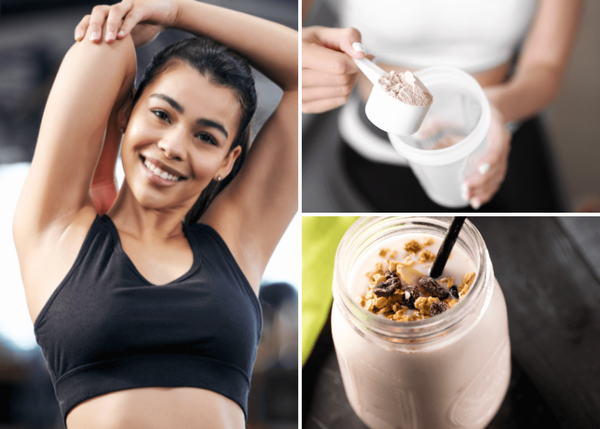Key Takeaways
- Understanding Protein Needs: Seniors require more protein than younger adults to maintain muscle mass and support overall health.
- Optimal Protein Sources: Both animal and plant proteins are essential, with specific recommendations for daily intake.
- Health Implications: Adequate protein intake can prevent muscle loss, support bone health, and reduce the risk of chronic diseases.
The Importance of Protein for Seniors
Protein is a key nutrient that supports many body functions. For seniors, getting enough protein is crucial to combat the natural muscle loss that comes with aging, known as sarcopenia.
This condition can reduce strength, cause mobility issues, and increase the risk of falls and fractures by affecting skeletal muscle.

After age 50, the body’s ability to build and maintain skeletal muscle declines. Protein helps protect muscles and promotes muscle growth.
It also supports the immune system, aids in wound healing, and keeps skin and hair healthy. Ensuring seniors get enough protein is vital for their overall health and well-being.
Physiological Impact of Aging on Body Composition
Aging leads to a gradual decline in resting metabolic rate (RMR) by about 1%–2% per decade after age 20.
In young adults, lean muscle mass makes up about 50% of total body weight, but this drops to around 25% by age 75–80.
RMR is the energy your body uses at rest to keep vital functions like breathing and circulation going.
As we age, RMR decreases, mainly because we lose lean muscle mass. This muscle loss is a major factor in the drop in RMR.
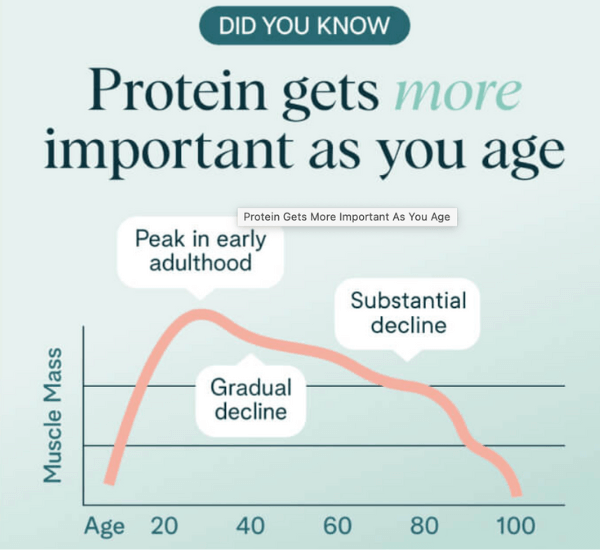
A lower RMR means the body burns fewer calories at rest, which can lead to weight gain and obesity if diet isn’t adjusted. This can also increase the risk of metabolic disorders like type 2 diabetes and heart disease.
Additionally, losing muscle mass can reduce strength and mobility, raising the risk of falls and fractures.
A slower metabolism can also make it harder for the body to process nutrients, leading to deficiencies and a weaker immune system.
To counter these effects, it’s important to stay active and eat a balanced diet as we age. Including sources of protein rich in the essential amino acid leucine, such as beef and chicken, can help maintain muscle mass and support metabolism.
How Much Protein Do Seniors Need?
The recommended dietary allowance (RDA) for protein varies based on age, sex, and activity level. For healthy older adults, the general guideline is to consume 1.0 to 1.2 grams of protein per kilogram of body weight daily.
This amount is higher than the RDA for younger adults, which is typically 0.8 grams per kilogram of body weight.
For example, a 70-year-old woman weighing 70 kilograms (154 pounds) should aim for 70 to 84 grams of protein per day.
It’s important to include sources of animal protein, such as meat, fish, and dairy, which provide essential amino acids necessary for maintaining muscle mass, strength, and bone health.
Individual needs may vary, and consulting with a healthcare provider or a registered dietitian can help determine the optimal protein intake for specific health conditions and lifestyle factors.
Protein Sources for Seniors
Seniors can obtain protein from a variety of sources, including both animal and plant-based options.
Animal proteins, such as chicken breast, red meat, fish, eggs, and dairy products, are complete proteins that contain all of the following nine essential amino acids:
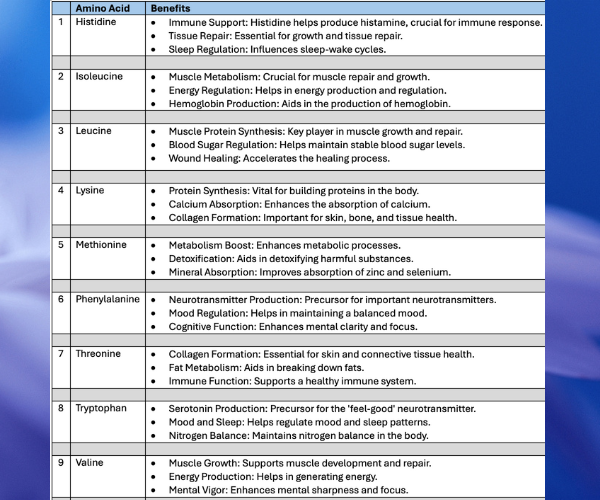
These sources are particularly beneficial for maintaining muscle mass and supporting overall health.
Plant proteins, such as beans, lentils, tofu, quinoa, and nuts, are also valuable additions to a senior’s diet.
While some plant proteins may lack one or more essential amino acids, combining different plant sources can provide a complete protein profile.
For instance, pairing beans with rice or hummus with whole-grain bread can ensure a balanced intake of amino acids.
Food Sources of Protein
Animal-Based Sources (e.g., Poultry, Eggs, Seafood, Red Meat, Dairy)
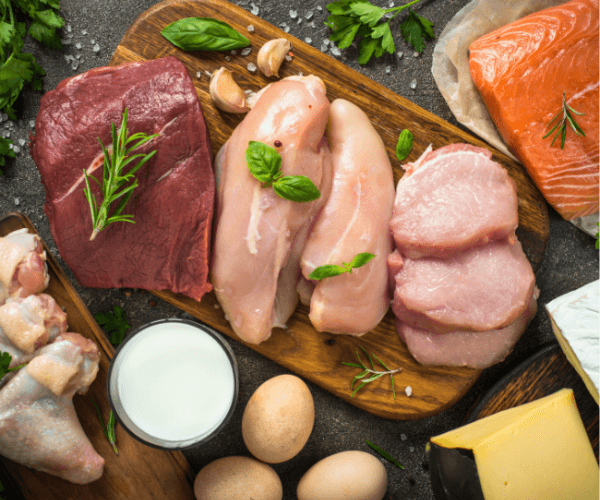
- Chicken breasts are a good source of protein, with 25 grams per 3-ounce serving.
- Eggs are another high-protein food, with 6.24 grams per large egg.
- Greek yogurt is a high-protein dairy option, with 20 grams per cup.
Plant-Based Sources (e.g., Soybeans, Vegetables, Beans, Nuts, Seeds)
- Soybeans are a plant-based protein powerhouse, with 29 grams of protein
Protein Per Meal: Spreading Intake Throughout the Day
To maximize the benefits of protein consumption, it's advisable for seniors to distribute their protein intake evenly throughout the day.
Studies suggest that consuming 20 to 30 grams of protein per meal can help stimulate muscle protein synthesis more effectively than consuming the same amount of protein in one meal.
For example, a senior could aim for 25 grams of protein at breakfast, lunch, and dinner, with additional protein-rich snacks if needed.
This approach not only supports muscle health but also helps maintain steady energy levels and satiety throughout the day.
Protein Drinks and Shakes: Convenient Options
Protein drinks and shakes can be convenient options for seniors who struggle to meet their protein needs through whole foods alone.
These products are available in various forms, including ready-to-drink shakes, protein powders, and meal replacement beverages.
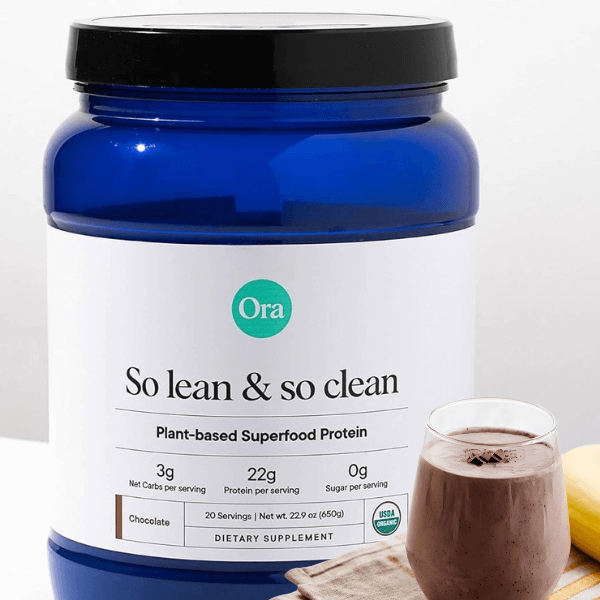
When choosing protein drinks, it's important to consider the protein content, ingredient quality, and any added sugars or artificial additives.
Greek yogurt-based smoothies, whey protein shakes, and plant-based protein powders are popular choices that can be easily incorporated into a senior's diet.
Related: What is a Good Tasting Protein Powder? Here are 5 You'll Love?
The Role of Protein in Bone Health
In addition to supporting muscle mass, protein plays a crucial role in maintaining bone health. Adequate protein intake is associated with higher bone mineral density and a reduced risk of fractures in older adults.
This is particularly important for seniors, as bone density tends to decrease with age, increasing the risk of osteoporosis and related complications.

Animal proteins, such as dairy products and fish, are rich in calcium and vitamin D, which are essential for bone health. Plant proteins, such as tofu and fortified plant-based milks, can also contribute to a balanced diet that supports strong bones.
Protein and Chronic Diseases
Adequate protein intake can help prevent and manage chronic diseases that are common among seniors, such as type 2 diabetes, cardiovascular disease, and chronic kidney disease.
Protein helps regulate blood sugar levels, supports heart health, and aids in maintaining a healthy weight.
For seniors with chronic kidney disease, it's important to work with a healthcare provider to determine the appropriate protein intake, as excessive protein consumption can strain the kidneys.
However, for most healthy older adults, increasing protein intake can have significant health benefits.
Practical Tips for Increasing Protein Intake
Are you wondering if you're getting enough protein? We give you the formula to understand your daily protein needs:
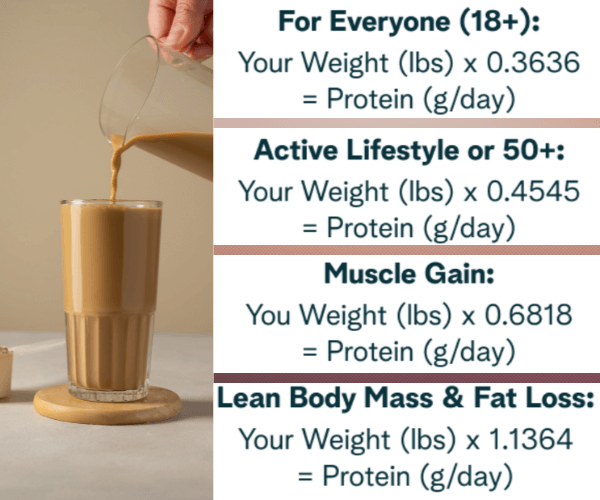
Incorporating more protein into a senior's diet doesn't have to be complicated. Here are some practical tips to boost protein intake:
- Start the Day with Protein: Include protein-rich foods in breakfast, such as eggs, Greek yogurt, or a protein smoothie.
- Snack Smart: Choose protein-rich snacks like nuts, cheese, or hummus with vegetables.
- Add Protein to Meals: Incorporate beans, lentils, or tofu into soups, salads, and casseroles.
- Opt for Lean Meats: Choose lean cuts of meat, such as chicken breast or turkey, and include fish in the diet regularly.
- Try Protein Supplements: Use protein powders or ready-to-drink shakes to supplement meals and snacks.
The Impact of Physical Activity on Protein Needs
Physical activity plays a significant role in determining protein requirements for seniors. Regular exercise, particularly resistance training, can help preserve muscle mass and enhance the body's ability to utilize protein effectively.

Seniors who engage in regular physical activity may require higher protein intake to support muscle repair and growth. Combining protein-rich meals with exercise can optimize muscle health and overall well-being.
Protein Needs for Functionally Impaired Seniors
Functionally impaired seniors, such as those with mobility issues or chronic illnesses, may have different protein needs compared to healthy older adults.
These individuals often require more protein to prevent muscle loss and support recovery from illness or injury.
Healthcare providers and registered dietitians can offer personalized recommendations for protein intake based on the specific needs and health conditions of functionally impaired seniors.
Ensuring adequate protein consumption is crucial for maintaining independence and quality of life.
The Role of Protein in Weight Management
Protein can be a valuable ally in weight management for seniors. High-protein diets have been shown to promote satiety, reduce appetite, and support weight loss efforts.
For seniors looking to lose weight or maintain a healthy weight, incorporating more protein into their diet can be beneficial.

Protein-rich foods, such as lean meats, fish, eggs, and legumes, can help seniors feel fuller for longer, reducing the likelihood of overeating.
Additionally, protein supports the preservation of lean muscle mass during weight loss, which is important for maintaining metabolic health.
Protein and Cognitive Health
Emerging research suggests that protein intake may also play a role in cognitive health.
Adequate protein consumption is associated with better cognitive function and a reduced risk of cognitive decline in older adults.
A diet rich in protein, along with other essential nutrients, can support brain health and improve memory, attention, and overall cognitive performance.
Including a variety of protein sources in the diet can contribute to optimal cognitive function and healthy aging.
The Benefits of Plant-Based Proteins
While animal proteins are often highlighted for their complete amino acid profiles, plant-based proteins offer numerous health benefits as well.
Plant proteins are typically lower in saturated fat and cholesterol, making them heart-healthy options for seniors.
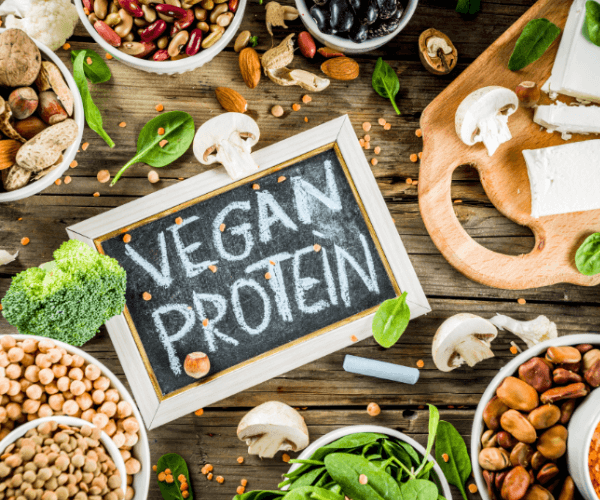
Incorporating a variety of plant-based proteins, such as beans, lentils, quinoa, and nuts, can provide essential nutrients and promote overall health.
Plant-based diets have been associated with a lower risk of chronic diseases, making them a valuable addition to a senior's dietary plan.
The Role of Protein in Immune Function
Protein is essential for a healthy immune system. It provides the building blocks for immune cells and antibodies, which help the body fight off infections and illnesses.
For seniors, maintaining a strong immune system is particularly important, as the immune response tends to weaken with age.

Ensuring adequate protein intake can support immune function and reduce the risk of infections. Including a variety of protein sources in the diet can provide the necessary nutrients to keep the immune system functioning optimally.
Protein and Wound Healing
Protein plays a critical role in wound healing and tissue repair. For seniors, who may be more prone to injuries and surgeries, adequate protein intake is essential for promoting recovery and preventing complications.
Protein-rich foods, such as lean meats, fish, eggs, and dairy products, provide the necessary amino acids for tissue repair and regeneration.
Ensuring that seniors consume enough protein can support faster healing and better outcomes after injuries or surgeries.
The Impact of Protein on Skin Health
Protein is a key component of healthy skin. It provides the building blocks for collagen and elastin, which are essential for maintaining skin elasticity and firmness.
For seniors, adequate protein intake can help prevent skin thinning and promote a youthful appearance.

Including protein-rich foods in the diet, such as fish, eggs, and dairy products, can support skin health and reduce the risk of skin-related issues.
Additionally, staying hydrated and consuming a balanced diet with plenty of fruits and vegetables can further enhance skin health.
Protein and Hair Health
Protein is also important for maintaining healthy hair. Hair is primarily made up of a protein called keratin, and adequate protein intake is essential for hair growth and strength.
For seniors, consuming enough protein can help prevent hair thinning and promote healthy hair.
Including a variety of protein sources in the diet, such as lean meats, fish, eggs, and legumes, can provide the necessary nutrients for healthy hair.
Additionally, ensuring adequate intake of vitamins and minerals, such as biotin and zinc, can further support hair health.
The Role of Protein in Muscle Repair
Protein is essential for muscle repair and recovery, especially after physical activity.
For seniors who engage in regular exercise, consuming enough protein is crucial for supporting muscle health and preventing muscle loss.
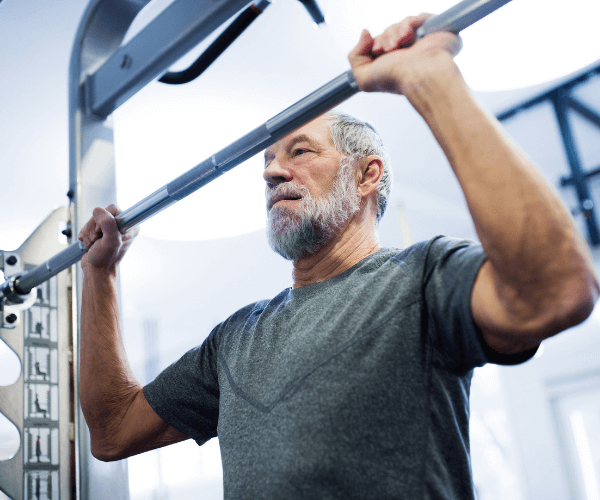
Including protein-rich foods in post-workout meals can help promote muscle repair and growth. For example, a post-exercise snack could include a protein shake, Greek yogurt with fruit, or a turkey sandwich on whole-grain bread.
Protein and Energy Levels
Protein plays a role in maintaining steady energy levels throughout the day. Unlike carbohydrates, which can cause rapid spikes and crashes in blood sugar levels, protein provides a more sustained source of energy.
For seniors, consuming protein-rich meals and snacks can help maintain energy levels and prevent fatigue. Including a balance of protein, healthy fats, and complex carbohydrates in the diet can support overall energy and well-being.
The Benefits of Protein for Heart Health
Protein can also support heart health, particularly when it comes from lean and plant-based sources.
Diets rich in plant proteins, such as beans, lentils, and nuts, have been associated with a lower risk of cardiovascular disease.

Choosing lean animal proteins, such as chicken breast and fish, can also contribute to heart health by providing essential nutrients without excessive saturated fat.
Incorporating a variety of protein sources in the diet can support a healthy heart and reduce the risk of heart-related issues.
Protein and Digestive Health
Protein is important for maintaining a healthy digestive system. It provides the building blocks for enzymes and other proteins involved in digestion and nutrient absorption.
For seniors, ensuring adequate protein intake can support digestive health and prevent issues such as constipation and malnutrition.
Including a variety of protein sources in the diet, along with fiber-rich foods, can promote healthy digestion and overall well-being.
Staying hydrated and engaging in regular physical activity can further support digestive health.
The Role of Protein in Hormone Regulation
Protein plays a role in hormone regulation, which is important for maintaining overall health and well-being.
Hormones are involved in various bodily functions, including metabolism, growth, and mood regulation.
For seniors, consuming enough protein can support hormone balance and prevent issues related to hormonal imbalances.
Including a variety of protein sources in the diet, along with other essential nutrients, can promote optimal hormone function.
Protein and Sleep Quality
Adequate protein intake can also support better sleep quality. Protein provides the building blocks for neurotransmitters involved in sleep regulation, such as serotonin and melatonin.
For seniors, consuming enough protein can help promote restful sleep and prevent sleep disturbances.

Including protein-rich foods in evening meals and snacks, such as turkey, Greek yogurt, or a protein shake, can support better sleep.
Additionally, maintaining a regular sleep schedule and creating a relaxing bedtime routine can further enhance sleep quality.
The Benefits of Protein for Mental Health
Protein is important for mental health and cognitive function. It provides the building blocks for neurotransmitters involved in mood regulation, such as dopamine and serotonin.
For seniors, consuming enough protein can support mental well-being and prevent issues such as depression and anxiety.
Including a variety of protein sources in the diet, along with other essential nutrients, can promote optimal mental health.
Engaging in regular physical activity and maintaining social connections can further support mental well-being.
Protein and Hydration
Protein can also play a role in maintaining proper hydration. Some protein-rich foods, such as dairy products and fruits, have high water content, which can contribute to overall hydration. For seniors, staying hydrated is essential for overall health and well-being.
Including a variety of protein sources in the diet, along with plenty of water and other hydrating beverages, can support proper hydration. Monitoring fluid intake and adjusting based on individual needs can further promote optimal hydration.
The Role of Protein in Metabolism
Protein plays a role in maintaining a healthy metabolism. It provides the building blocks for enzymes involved in metabolic processes, such as energy production and nutrient utilization.
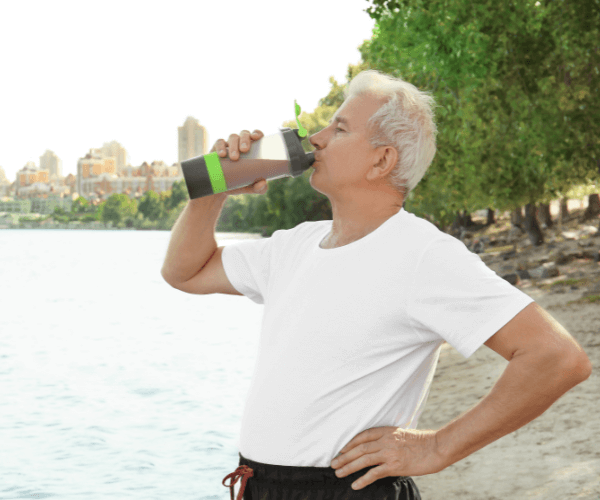
For seniors, consuming enough protein can support a healthy metabolism and prevent issues such as weight gain and fatigue.
Including a variety of protein sources in the diet, along with regular physical activity, can promote a healthy metabolism.
Ensuring adequate intake of other essential nutrients, such as vitamins and minerals, can further support metabolic health.
Protein and Immune Aging
As we age, the immune system tends to weaken, a process known as immune aging. Adequate protein intake can help support immune function and reduce the risk of infections and illnesses.
For seniors, consuming enough protein is essential for maintaining a strong immune system.

Including a variety of protein sources in the diet, along with other immune-boosting nutrients, such as vitamins C and D, can support immune health.
Engaging in regular physical activity and maintaining a healthy lifestyle can further promote immune function.
The Benefits of Protein for Joint Health
Protein is important for maintaining healthy joints. It provides the building blocks for collagen, which is essential for joint health and flexibility. For seniors, consuming enough protein can help prevent joint issues and support overall mobility.
Including protein-rich foods in the diet, such as fish, eggs, and dairy products, can support joint health. Additionally, staying active and maintaining a healthy weight can further promote joint health and prevent issues such as arthritis.
Protein and Vision Health
Protein plays a role in maintaining healthy vision. It provides the building blocks for proteins involved in eye health, such as collagen and keratin. For seniors, consuming enough protein can help prevent vision issues and support overall eye health.
Including a variety of protein sources in the diet, along with other vision-supporting nutrients, such as vitamins A and E, can promote healthy vision. Regular eye check-ups and protecting the eyes from excessive sunlight can further support eye health.
The Role of Protein in Healthy Aging
Protein is essential for healthy aging. It supports various bodily functions, including muscle health, bone health, immune function, and cognitive health. For seniors, consuming enough protein is crucial for maintaining overall health and well-being.
Including a variety of protein sources in the diet, along with other essential nutrients, can promote healthy aging. Engaging in regular physical activity, staying hydrated, and maintaining a healthy lifestyle can further support optimal health and well-being.
Final Thoughts
Understanding the protein requirements for seniors is essential for promoting overall health and well-being. Adequate protein intake supports muscle mass, bone health, immune function, and various other bodily functions.
By incorporating a variety of protein sources into the diet and spreading protein intake throughout the day, seniors can optimize their health and prevent issues related to aging.
Protein Requirements for Seniors FAQ's
Q: How much protein should a senior consume daily?
A: Healthy older adults should aim for 1.0 to 1.2 grams of protein per kilogram of body weight daily.
For example, a 70-year-old woman weighing 70 kilograms (approx. 154 lbs.) should consume 70 to 84 grams of protein per day.
Q: What are some good protein sources for seniors?
A: Seniors can obtain protein from both animal and plant-based sources. Good options include chicken breast, fish, eggs, dairy products, beans, lentils, tofu, quinoa, and nuts.
Q: Can protein drinks and shakes be beneficial for seniors?
A: Yes, protein drinks and shakes can be convenient options for seniors who struggle to meet their protein needs through whole foods alone.
It's important to choose products with high-quality ingredients and minimal added sugars or artificial additives.








